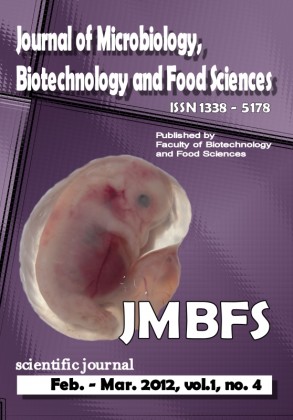THE EFFECT OF DIFFERENT CONCENTRATION OF TREHALOSE ON TURKEY SPERMATOZOA MOTILITY IN VITRO
Keywords:
turkey, spermatozoa, motility, CASA, trehaloseAbstract
Target of this study was to analyze the effect of a different trehalose concentration (T10 – 10 mg.ml-1; T5 – 5 mg.ml-1; T2.5 – 2.5 mg.ml-1; T1.25 – 1.25 mg.ml-1) on the turkey spermatozoa motility parameters after a culture in vitro at 5°C. For control the semen samples were diluted with physiological solution. Individual parameters were recorded at six time periods: 0, 30, 60, 90, 120, 150, 180 minutes. The highest values of spermatozoa motility were determined in samples containing 10 mg.ml-1 of trehalose. The highest motility of 88.16% was recorded after 30 minutes of culture in the sample T10. Significantly (p<0.01) higher data were detected in T10 samples compared to control after 90 minutes of culture. After 180 minutes of culture a significantly (p<0.01) higher motility was detected in control. In the samples T5; T2.5 and T1.25 similar significantly lower values were recorded compared to control, except for T1.25 at the time of 90 minutes of culture. The highest progressive motility 77.97% was observed in samples T10 after 30 minutes of culture. A significantly lower value in group T10 (p<0.05) was detected at time 180. When compared to other control lower values at of all time periods were found.Downloads
Download data is not yet available.
Downloads
Published
2012-02-01
How to Cite
Slanina*, T., MiÅ¡keje, M., KnÞat, ĽubomÃÂr, Mirda, J., & Massányi, P. (2012). THE EFFECT OF DIFFERENT CONCENTRATION OF TREHALOSE ON TURKEY SPERMATOZOA MOTILITY IN VITRO. Journal of Microbiology, Biotechnology and Food Sciences, 1(4), 573–582. Retrieved from https://office2.jmbfs.org/index.php/JMBFS/article/view/7256
Issue
Section
Biotechnology
License
Copyright (c) 2012 Tomáš Slanina*, Michal MiÅ¡keje, ĽubomÃÂr KnÞat, Juraj Mirda, Peter Massányi

This work is licensed under a Creative Commons Attribution 4.0 International License.
All papers published in the Journal of Microbiology, Biotechnology and Food Sciences are published under a CC-BY licence (CC-BY 4.0). Published materials can be shared (copy and redistribute the material in any medium or format) and adapted (remix, transform, and build upon the material for any purpose, even commercially) with specifying the author(s).

